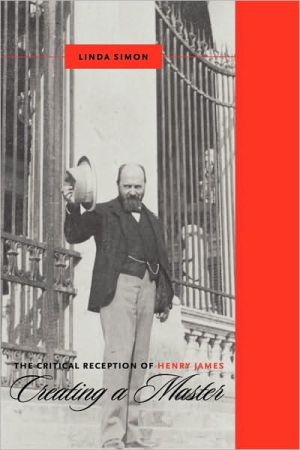

 |

|

The average rating for The Critical Reception of Henry James: Creating a Master based on 2 reviews is 3 stars.
Review # 1 was written on 2011-06-09 00:00:00 ken sutherland ken sutherlandThe term black postmodernism has, for a long long time, been read as oxymoronic. Understanding why, and understanding why Dubey's intervention with postmodern theory is so significant, means having a sense of the discourse that shapes postmodernism. Simply put, the argument goes that for literature to qualify as postmodern it must conform to the period's dominant aesthetic. This, in itself, is just a tautology. Postmodernism's dominant aesthetic - and this is borne out by aesthetes and materialists alike - is defined by poststructuralism, a body of philosophy that establishes (among other things) that language A. is our only means of accessing reality and B. radically distances the subject from anything that might be called objective reality, or the real. Here, then, postmodern literature turns inward - becomes involuted, meta- , solipsistic - becoming a literature about language, about itself. This inward turn, the much-lamented denial of the real, has a lot of consequences (and this is where materialists (i.e., Marxists (e.g., Fredric Jameson)) start to lose their cool) among these being a denial of the political. On the surface this looks right. The mandarins of postmodern literature - Pynchon, Barth, Gaddis, Gass, Markson - are revered for their high-concept, difficult texts that are high-concept and difficult because they seek to engage and literalize logocentrism and, further, only offer social commentary to the extent of suggesting that we've become involuted and solipsistic. This hermetic cycle functions via a totally self-serving logic: to render a political argument in one's novel either diminishes its quality as literature or disqualifies it as literature altogether, knocking it down to, say, genre fiction. In other words, it's not that politically engaged books can't be written, it's that politically engaged books aren't considered high art and so can't alter the aesthetic rubric that defines what gets considered high art. Since politics must be rooted in the real and poststructuralism denies both rootedness and reality there's no purchase within postmodernism to mount a political intervention. And it's this same tortured logic that renders black postmodernism an oxymoron. Since the black subject, and by extension black language, is socially understood to be grounded in a realer reality than everyone else's, any black literary effort immediately fails the politics test. And so, for a long long time, black literature was either looked at as being inferior as literature (e.g., Mumbo Jumbo, Beloved) or, as Percival Everett rightly laments, mere genre fiction (e.g., Devil in a Blue Dress, Stars in My Pocket Like Grains of Sand). And it's here that Dubey's intervention, as I understand it, begins. This intervention is also super complex (this is why it took me so long to finish). Dubey takes on the exclusionary logic of postmodernism on both fronts, namely the material and the aesthetic, in order to show that literary postmodern texts can be written by black authors and that these texts can engage politics without getting kicked out of the pomo club. Political engagement here comes to mean addressing and challenging late, or neo-liberal, capitalism, which further means employing a commodity (a book) to subvert commodification. This part of Dubey's argument was the most confusing to me (probably because I'm so much less well read in the materialist side of postmodernism), but it's through this line of thought that she suggests that the pronounced skepticism toward print culture arises (a skepticism that relates to the speech-print cultural dichotomy and racially proscribed impediments to literacy). All of this amounts to a challenging amalgam of seemingly disparate arguments. Black postmodern literature does exist and it can register and engage politics, but not by returning to the real, which can't exist, but by recognizing the necessity of the fallacious narratives that poststructuralism delegitimized. Dubey comes to this point in her last chapter and it is remarkable to me because of how much it sounds like the New Sincerity, which reconciles poststructuralism's deconstructive bent by observing that just because a sign or value or narrative is found to be centerless does not then also mean that it no longer serves to structure our thoughts or culture or reality. Dubey assigns this pragmatism to black authors who can successfully balance aesthetics - demanding a thorough understanding of poststructuralism - and politics. Because of how many variables Dubey puts in play in this book, I'm sure I didn't fully understand the extent of her nuanced argument, but, as it directly addresses one of the toughest questions confronting today's scholars of this moment's belles-lettres, it remains, nevertheless, crucial to any future criticism on contemporary literature. |
Review # 2 was written on 2014-06-30 00:00:00 Kirk Marshall Kirk MarshallAdmittedly, I've still got a good chunk of this book to read before I'll be officially "done," but I'll probably be saving it for when I'm closer to my dissertation. Dubey's book isn't just a fine piece of scholarship (it synthesizes a bunch of major strains in recent African-American literary scholarship into a neat package for both newcomers and experts), but also incredibly problematizing for anyone who has read Jameson and Lyotard and said, "Eh, I've got this postmodernism thing down." Highly recommended. |
CAN'T FIND WHAT YOU'RE LOOKING FOR? CLICK HERE!!!